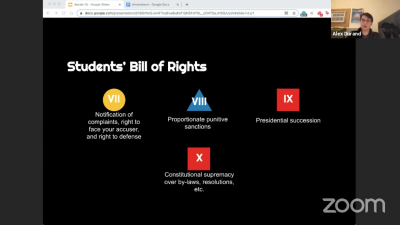
Boston University Student Government discussed campus technology updates, a new proposal to condense its constitution and continued conversations about adding a definition of “college” to its constitution in a Zoom meeting Monday night.
StuGov spent the first half of the meeting discussing a potential amendment that would define a BU college as “any undergraduate unit at Boston University that (1) a student must apply to before matriculation ; (2) confers or jointly confers an undergraduate degree; and (3) has its own specified curriculum and program requirements.”
These changes intend to classify Kilachand Honors College as a college under StuGov, granting them Senate representation.
KHC representatives and College of Arts and Sciences seniors Noelle Wojciechowski and Francesca Davy-Falconi presented the amendment.
“There is a real possibility that there could be another college created at BU,” Wojciechowski said, “and frankly they shouldn’t have to go through all of the hoops that we’ve had to jump through in order to get representation.”
At-large Sen. Samantha Casas, a CAS junior, raised concerns that the definition could potentially allow for double representation in StuGov.
“There’s going to be students who are not double represented or it’s going to exacerbate the issue of double representation,” she said, “which means that some students are going to have access to senators that other students do not, within a normal sense, that they didn’t vote on.”
Casas added at-large parties are a traditional method of “supplemental representation,” not necessarily StuGov.
The Senate voted to postpone further discussion of the amendment until Monday.
The meeting continued with a brief presentation from CAS junior Sen. Hessann Farooqi on campus technology resources.
Farooqi, a member of the Student Technology Advisory Council, shared BU Information Services and Technology’s two phone numbers as a way for students to report classroom technology and WiFi issues.
“You can actually, through both of the hotlines, email and phone that they have set up,” Farooqi said, “report exactly what your WiFi issue is and where you are.”
He said problems can be resolved more efficiently if students utilize those resources.
“That will make it a whole lot more likely that they’ll be able to fix it,” Farooqi said, “so that they’ll have a good idea of where the real problem areas are.”
Farooqi noted if many people in one location experience WiFi issues, they should all contact tech support so IST can more accurately understand the situation and how it’s affecting particular parts of campus.
The meeting then moved to a discussion of amendments — meant to condense StuGov’s 22-page constitution to nine pages — that were proposed by Farooqi as well as Associate Justices Alex Durand, a senior in the Frederick S. Pardee School of Global Studies, and Daniel Daponte, a CAS junior.
The team said they worked to condense the constitution by “simplifying to only structural elements, clarifying discrepancies, expediting future changes to StuGov and adding a Students’ Bill of Rights.”
The Students’ Bill of Rights states any student can propose legislation, run for office — subject to BU rules — apply for an appointed position and address grievances with the judicial committee.
The Bill of Rights would also include a definitive presidential line of succession, notifications of complaints to those they are made about and the right to defense and asserted student constitutional access to StuGov members.
These changes would exclusively apply to BU StuGov — not to any of the individual college governments.
CAS junior Sen. Jessica Zheng supported the proposed changes.
“We are one of the only universities that has a 22-page constitution,” Zheng said. “I think this needed to be done last year, I’m so glad to see it done and I will be voting yes on this.”
Sen. Savannah Majarwitz, a CAS junior, inquired further on the complaint system proposed in the Bill of Rights, specifically about students who might complain but wish to remain anonymous.
“There is some jurisprudence in either when it comes to group accusations, you do organizational titles instead of an individual in U.S. court systems,” Durand said. “But we imagine that most of the situations in the Student Government system hopefully will not be like that.”
Other senators said they were confused about the purpose and title of the Bill of Rights. Sen. Evan Teplensky, a CAS sophomore, said the name seemed to be a misnomer.
“Bill of Rights to me sounds like, ‘as a student, you can do this, this, this, you can live on campus, you can do that, you can go to classes,’” he said. “That’s why I’m confused on why this is called ‘Students’ Bill of Rights.’”
The bill did not pass, but can be voted on again next week.
Abbigale Shi, editorial page editor of The Daily Free Press, is a Student Government Environmental Affairs cabinet staffer. She was not involved in the editing of this article.
Juncheng Quan, staff writer of The Daily Free Press, is a Student Government CAS Senator. He was not involved in the editing or reporting of this article.
Ilana Keusch, staff writer of The Daily Free Press, is a Student Government Associate Justice. She was not involved in the editing or reporting of this article.























































































































